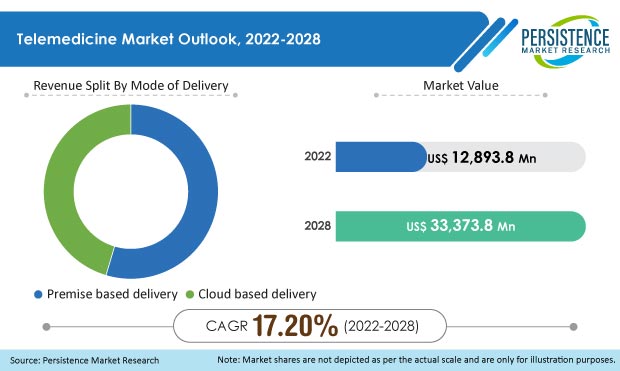The Telemedicine Market is likely to grow on a robust note in the next decade. The next decade would be seeing the integration of telehealth services with the physical ones that exist at the moment. Urgent care and primary care are bound to be accessed through virtual visits, along with improvement in collaboration with the clinics, dialysis centres, long-term care facilities, and mental health services. This shifting is to be witnessed in the healthcare vertical shortly.
Rapidly evolving technology plays a noteworthy role in making a patient’s healthcare journey easier. Combined with advancements in mobility and telepresence solutions, this is expected to create new unwired business models that are capable of providing care anywhere. According to the latest research by PMR, the global telemedicine market is expected to account over US$ 38,000 Mn by the end of 2029. The telemedicine market is expected to grow at a CAGR of 17.0% through the forecast period 2019-2029.
The integration of Internet of Things (IoT) sensors in healthcare equipment and machinery results in the mitigation of errors while dealing with a significant amount of sensitive patient data. Moreover, it eliminates human errors and reduces process-related time, cost, and power consumption, which is expected to drive the telemedicine market.
Strategizing The Moves For The Next Decade? See Through Sample Of Telemedicine Market
Company Profiles:
- Tele-Med International
- Babylon
- CareClix
- Global Telehealth Services
- AMD Global Telemedicine
- American Well
- Doctor on Demand
- MD INTERNATIONAL AB
- Encounter Telehealth
- MDLIVE Inc.

Starting With The New Decade On A Diligent Note In The Telemedicine
Nearly 30% Market Value Share Slated for Asia Pacific
Asia Pacific is expected to account for approximately 30% share of the global telemedicine market by 2025, which is primarily driven by a reduction in the cost of primary care and improvement in the delivery of quality healthcare to the last mile in China and India. Increasing Y-o-Y (%) growth in GDP (at constant prices), coupled with growing urbanization in certain countries, such as China, India, and Indonesia, is expected to boost the spending on public infrastructure, and, in turn, boost the telemedicine market. The adoption of digital services offers better connectivity and collaboration, which increases accessibility to information and services. This is also expected to spur the Asia Pacific telemedicine market over the forecast period.
The telemedicine market is a very lucrative market that offers new players high return on investment. Telehealth companies are focusing on acquisitions to grow their business, especially in emerging economies such as Asia Pacific and Latin America. For instance, in 2018, Teladoc Inc. acquired Advance Medical Inc. to expand its market share in Latin America and Asia Pacific. This acquisition also enabled Teladoc Inc. to provide care in 20 languages through its platform. Similarly, InTouch Health acquired Reach Health to broaden its footprint and boost its ability to help its customers introduce telehealth programs across the care continuum.
Furthermore, lack of infrastructure and internet connectivity is among the key factors hampering the progress of telemedicine in developing economies. For instance, the minimum speed of the internet required for consultation via telemedicine services is 2 Mbps, which is not available in most of the villages of India. Moreover, the penetration of broadband is less than 2% in India. In addition, only a limited number of individuals in developing countries use the internet. For example, the percentage of internet users in India, Indonesia, and Brazil is 35%, 32%, and 60% respectively, which is likely to hinder the growth of the telemedicine market.
Other factors, such as the increasing use of smartphones, use of wireless technologies that bring cost-efficiency, improved accuracy of treatment & diagnosis, reduced consultation time, and the need to maintain high standards of delivery of service by providing access to quality care on a real-time basis are also some of the factors contributing to the growth of the telemedicine market. Growing awareness about telemedicine services, especially among the younger and middle-aged population globally, has led to the high demand for online consultations and second opinions, as these services help patients receive medical advice from physicians across the world.
The North America and Europe telemedicine markets are expected to have a combined share of over 53% of the global telemedicine market during the forecast period. This can be primarily attributed to growth in the ageing population worldwide and increasing life expectancy, which is expected to be a significant burden on the healthcare systems in regions such as Western Europe, the U.S, and emerging economies.
The report offers a comprehensive taxonomy of the telemedicine market based on the service type, mode of delivery, end user, and region. Based on product type, the global telemedicine market is segmented into real-time telemedicine and remote patient monitoring. Real-time telemedicine is further subsegmented into teleconsultation, telepathology, telecardiology, telesurgery, teleradiology, teledermatology, telepsychiatry, and others (teleopthalmology, teleneurology, and telenephrology).
How About Obtaining Insights About The Region To Enter Concerning The Telemedicine Market?
Based on the mode of delivery, the global telemedicine market is segmented into cloud-based delivery and premise-based delivery. Based on end user, the global telemedicine market is segmented into hospitals & clinics and homecare settings. The real-time telemedicine subsegment of the service type segment is expected to hold the maximum share in the global telemedicine market. From a geographical perspective, the telemedicine market is segmented into North America, Latin America, Europe, Asia Pacific, MEA ex. GCC & MENA, GCC Countries, and MENA.
Source: lakeshoregazette.com








